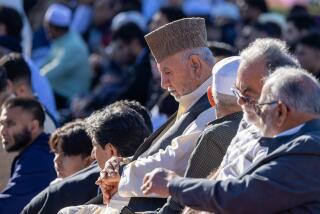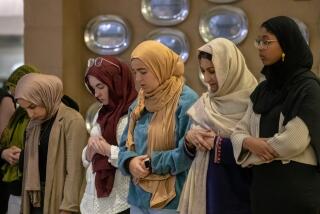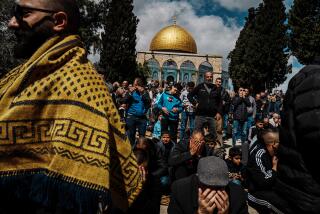Muslim Athletes Develop a Game Plan for Fasting
- Share via
During the month of Ramadan, two Muslim teenagers on the Magnolia High School basketball team have to execute something tougher than a crossover dribble: play in the afternoon after going all day without food or water.
Talal Trablci and Khalid Khoudari, who are on the freshman-sophomore team at the Anaheim school, will not be alone in competing on an empty stomach. Hundreds of Muslim high school athletes throughout Southern California face the same challenge: fasting during the daytime for a month while exercising up to four hours a day.
“I’m, like, used to it from last year,” said Khoudari, 14. “I feel that I’m strong enough to play and at the same time fast, which pleases God.”
Ramadan commemorates the revelation of the Koran, Islam’s holy book, to the prophet Muhammad. The Ramadan fast, which ends Dec. 27, is a basic tenet of Islam, expected of all Muslims who have reached puberty.
“I’m really proud,” said Mohammed Trablci of his 15-year-old son, Talal. “I’m so happy when he comes back from the game, and he’s still fasting.”
Given the growing Muslim population--estimated at up to 500,000 in Southern California--an increasing number of high school athletes have developed informal strategies to compete while fasting.
Todd Jones, Trablci’s and Khoudari’s coach, allows the boys to take a break from practice to break their fast once the sun goes down. And if a game starts near sunset, Jones will allow the players to eat and drink on the bench.
“They’re great kids,” Jones said. “They listen, and they’re very disciplined, as you can tell from the fasting. The only concern I have is for their health.”
Dr. Daniel Kharrazi, who practices sports medicine at the Kerlan-Jobe Orthopedic Clinic in Los Angeles, said a daytime fast won’t affect most athletes.
“For normal, healthy athletes, they have enough reserves,” said Kharrazi, who is not Muslim. “In terms of performance, it shouldn’t have a significant effect over the short term. But over time, you’ll use a lot more of the body’s reserves.
“But it’s really not the healthiest thing for the body overall.”
The Muslim athletes who fast during Ramadan are still not numerous enough to get on the radar of the athletic administration.
James Staunton, commissioner of the CIF Southern Section that oversees high school athletics, said he had not been aware of the Muslim students’ fast.
“We need to alert coaches and schools to be aware of cultural differences,” Staunton said.
Even in the absence of official policies, high school players praise their coaches for helping them get through their fasts.
“Our team got in trouble during practice and had to run laps--a mile,” said Zafar Jadwet, on the junior varsity soccer team for Royal High School in Simi Valley. “My coach told me I didn’t have to do it.”
Players on the Magnolia junior varsity basketball team appreciate what their Muslim teammates are going through, especially after many tried to fast for a day.
“They couldn’t do it,” said Khoudari, laughing. “They couldn’t make it past lunch.”
More to Read
Get our high school sports newsletter
Prep Rally is devoted to the SoCal high school sports experience, bringing you scores, stories and a behind-the-scenes look at what makes prep sports so popular.
You may occasionally receive promotional content from the Los Angeles Times.






